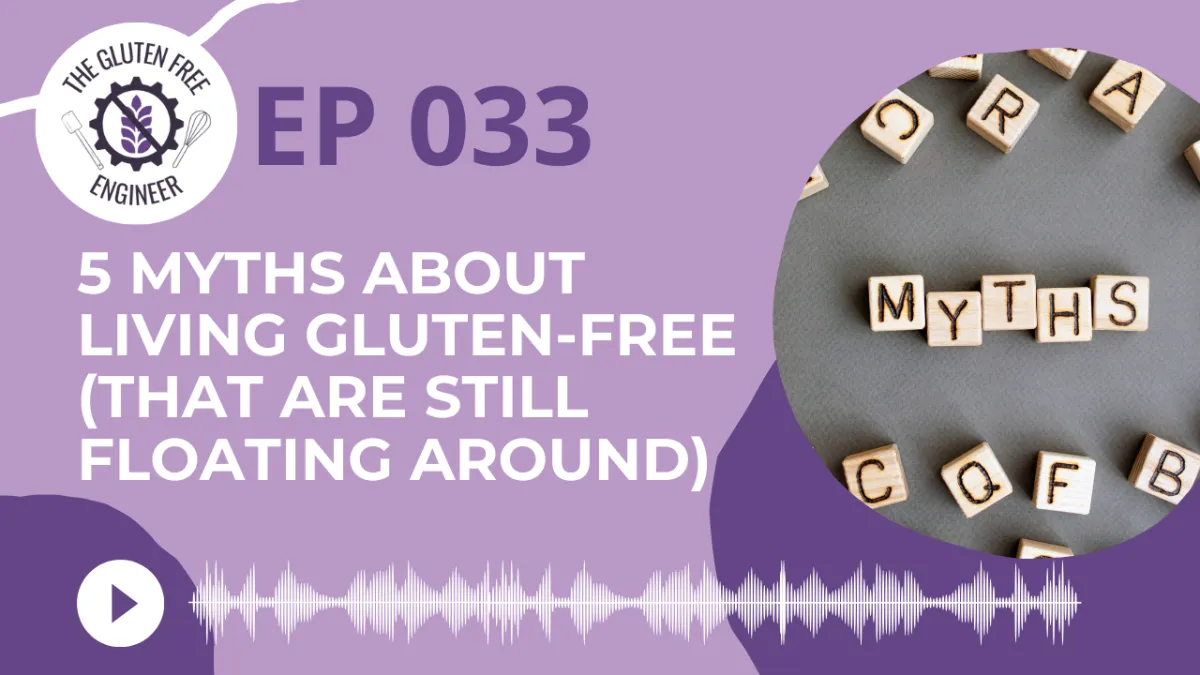
#33: 5 Myths About Living Gluten-Free (That Are Still Floating Around)
There’s a lot of information out there about living gluten-free – and unfortunately, not all of it is true. Some myths are harmless, but others can make life harder, cause confusion, or even put people’s health at risk.
Today, I’m busting 5 of the most common gluten-free myths I still hear all the time, even after more than a decade of living gluten-free myself.
Stick around until the end for my bonus tip – it’s the myth I believed when I was first diagnosed, and it made my gluten-free life a lot harder than it needed to be.
Let's Recap: 5 Gluten-Free Myths That Could Be Harming Your Health
Living with celiac disease or gluten intolerance isn't just about avoiding bread and pasta—it's about navigating a world of misinformation that can make your gluten-free journey unnecessarily difficult. After over a decade of living gluten-free since my 2011 celiac diagnosis, I've encountered countless myths that not only confused me but sometimes put my health at risk. Today, I'm tackling the five most persistent gluten-free myths that continue to circulate, even among those who've been gluten-free for years.
Myth 1: People with celiac disease can have "cheat days"
This is one of the most dangerous myths out there. For those with celiac disease, even a microscopic amount of gluten—we’re talking about a single crumb—can trigger an autoimmune response that damages the intestines.
What makes this particularly treacherous is that damage can occur without obvious symptoms. Even if you don’t feel immediate digestive distress, your body could still be suffering long-term harm.
For those with gluten intolerance or who avoid gluten due to other autoimmune conditions, "cheating" can still cause severe symptoms or worsen underlying health issues.
Myth 2: Anything labeled "gluten-free" is safe
Not all gluten-free products are created equal. There’s an important distinction between products labeled “gluten-free” and those that are “certified gluten-free.”
Gluten-free labeling generally means the product contains less than 20 parts per million of gluten, which is considered safe for most celiacs.
Certified gluten-free products undergo more rigorous testing and are often produced in dedicated facilities, reducing the risk of cross-contamination.
If you’re highly sensitive, always read the full label—including allergen statements that may reveal shared manufacturing facilities.
Myth 3: Going gluten-free automatically makes your diet healthier
This myth has been fueled by celebrity endorsements and marketing hype. Simply swapping regular processed foods for their gluten-free versions doesn’t guarantee a healthier diet.
In fact, many gluten-free processed foods contain more sugar, fat, and fewer nutrients than their gluten-containing counterparts. They’re also less likely to be fortified with essential vitamins and minerals.
A truly healthy gluten-free diet should focus on naturally gluten-free whole foods like:
Fruits and vegetables
Lean proteins
Gluten-free whole grains (such as quinoa, brown rice, and buckwheat)
Myth 4: You can "grow out of" celiac disease
Celiac disease is a lifelong autoimmune condition—you don’t outgrow it. While symptoms may lessen or disappear with strict gluten avoidance, the genetic predisposition and autoimmune response remain.
Some people may develop fewer or different symptoms over time, or even become "silent celiacs," where intestinal damage continues without obvious signs. This is why vigilance is crucial, no matter how well you feel.
Myth 5: No digestive symptoms means no harm
Not all gluten reactions show up as stomach issues. In fact, gluten can trigger a wide range of symptoms, including:
Fatigue
Brain fog
Migraines
Joint pain
Skin rashes
Mood changes
Neurological issues
Some people experience no digestive symptoms at all, but damage can still silently accumulate. Untreated celiac disease, for example, can lead to nutrient deficiencies, osteoporosis, infertility, or even certain cancers.
Moving Forward Gluten-Free
Understanding these myths is crucial for anyone navigating the gluten-free lifestyle—whether for celiac disease, non-celiac gluten sensitivity, or other health reasons.
By recognizing and dispelling these misconceptions, you can:
Better advocate for yourself
Educate others
Protect your long-term health with confidence
If you’re new to the gluten-free journey, know that it does get easier with time as you build knowledge and routines. And if you’ve been gluten-free for years, staying informed about evolving research and food standards helps you make the best choices for your health.
